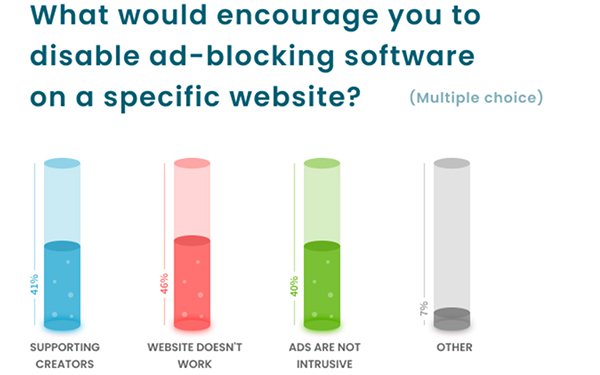
There is a growing trend among users to look beyond the
convenience of paying to remove ads or blocking them in a browser.
Some want to know what it would take for consumers to turn ads off.
AdGuard released data from a study conducted by
SurveyMonkey, which analyzes privacy and data tracking, and increasing concerns around data tracking. More than 500 U.S.-based users across different age groups and income levels were asked to
identify their primary reasons for using ad blockers. They were allowed to select more than one reason.
The survey results reveal that there is more to ad blockers than meets the eye. For many
users, ad blockers do more than just remove ads. They help improve browsing speed, enhance privacy, boost security, and remove visual clutter.
Some 40.84% of respondents would consider turning
off ad blockers if it meant supporting websites and content creators they value, and 40.29%, said they would consider disabling their ad blocker if the ads were non-intrusive and limited.
advertisement
advertisement
What
could prompt users to disable ad blockers and consider the advertisements to be non-intrusive? A clear understanding of website ad policies, including security measures and data-handling practices are
some factors.
Surprisingly, 36.26% of respondents prefer generic ads to maintain privacy and avoid tracking of their online behavior. Some 21.06% would rather see personalized ads, and 15.75%
are indifferent as long as the ads are not intrusive. About 26.92% view both types of ads — generic or not — as equally undesirable.
Visual clutter has become an eyesore, with
57.9% of respondents saying they want to get rid of too much information on a page -- something Google has attempted to reduce for years.
A cleaner and more streamlined browsing experience is
what consumers expect from an ad blocker.
Some 46.3% of respondents highlighted removing video ads as the primary reason for using an ad blocker.
Video ads are the most disruptive type
of ads, since they often auto-play and obscure large portions of content.
The most compelling reason to use an ad blocker, named by 45.79% of participants, is when a website does not function
properly with an ad blocker. This could mean failing to load content or greeting users with an ad-block wall.
When asked specifically about their concerns related to privacy and data tracking,
87.55% of respondents said they are worried about these issues, while some 12.4% of respondents said they were not really concerned about privacy and data tracking related to online ads.
The
study reveals a growing awareness and unease regarding how personal information is collected and used by advertisers and third parties.
More than 40% consider paying for ad-free access to
favorite websites. While a considerable portion of users consider paying for the ad-free content, it is still not the most popular opinion.
When asked whether they would be willing to pay for
ad-free access to their favorite websites, 40.29% -- about 2 out of 5 -- indicated that they would. In contrast, 15.20% of respondents said that they would rather put up with ads than pay for ad-free
access.
The majority, at 44.51%, said they would rather use ad blockers to remove advertisements, showing that ad blockers still considered by many consumers to be a reliable tool against
ads.